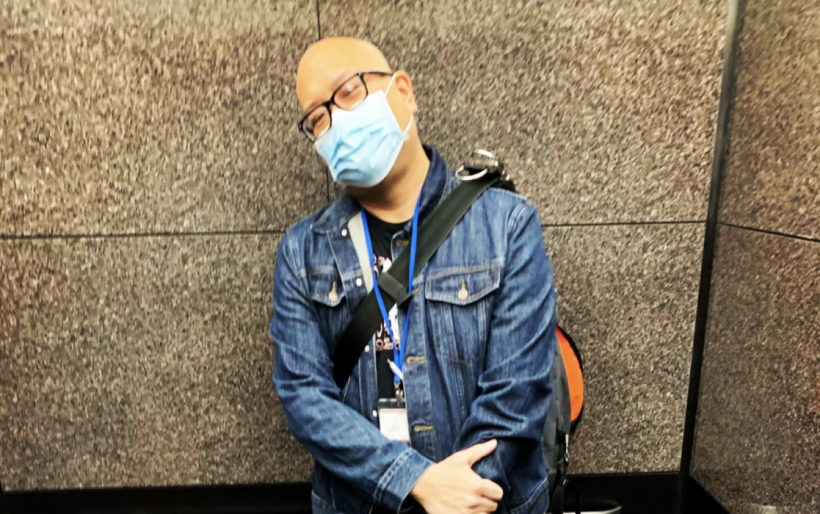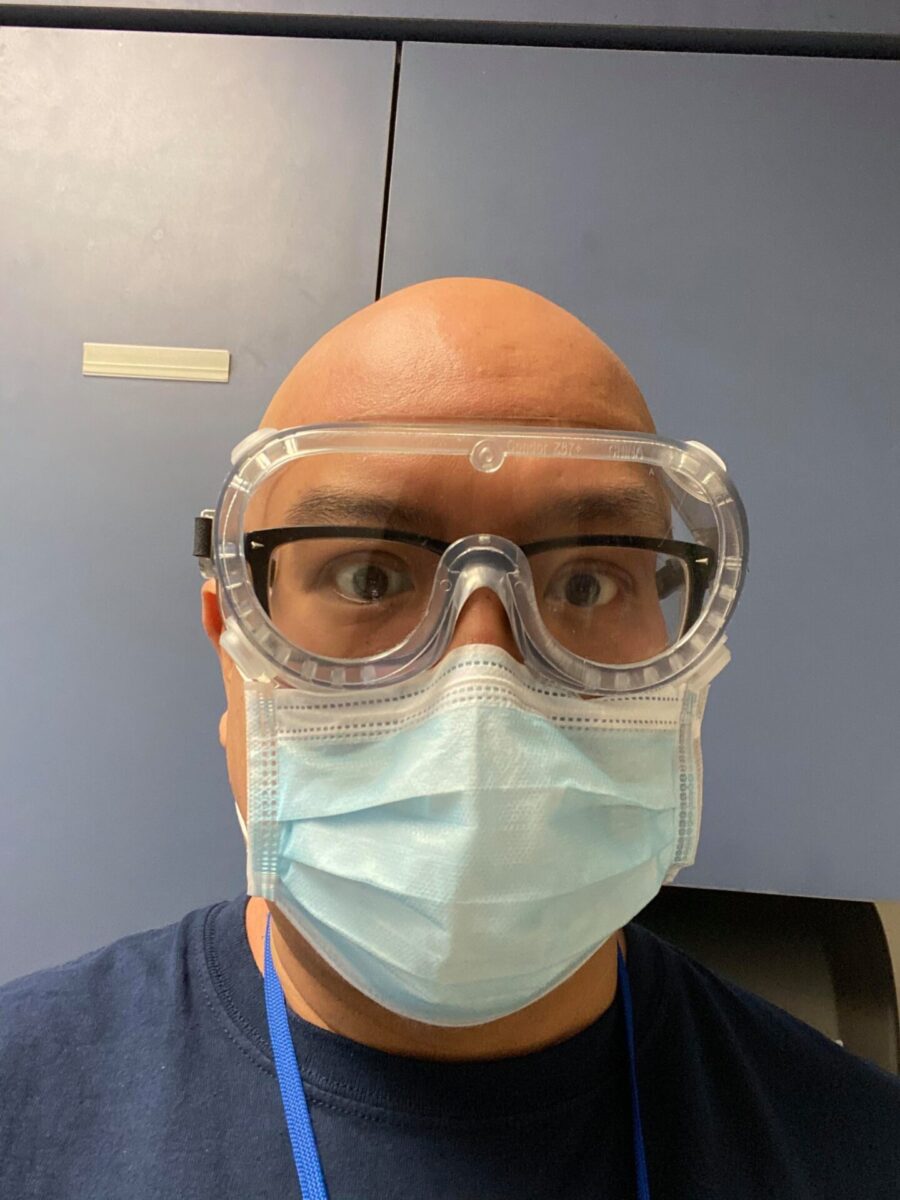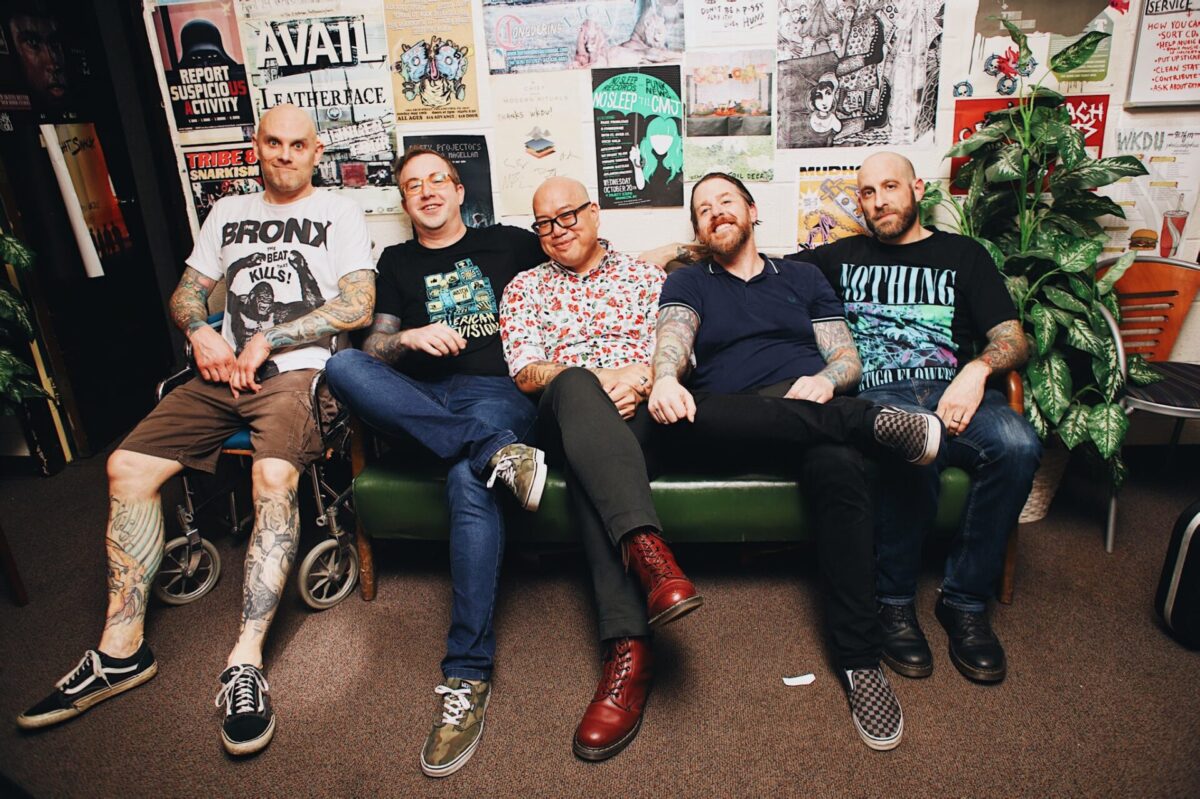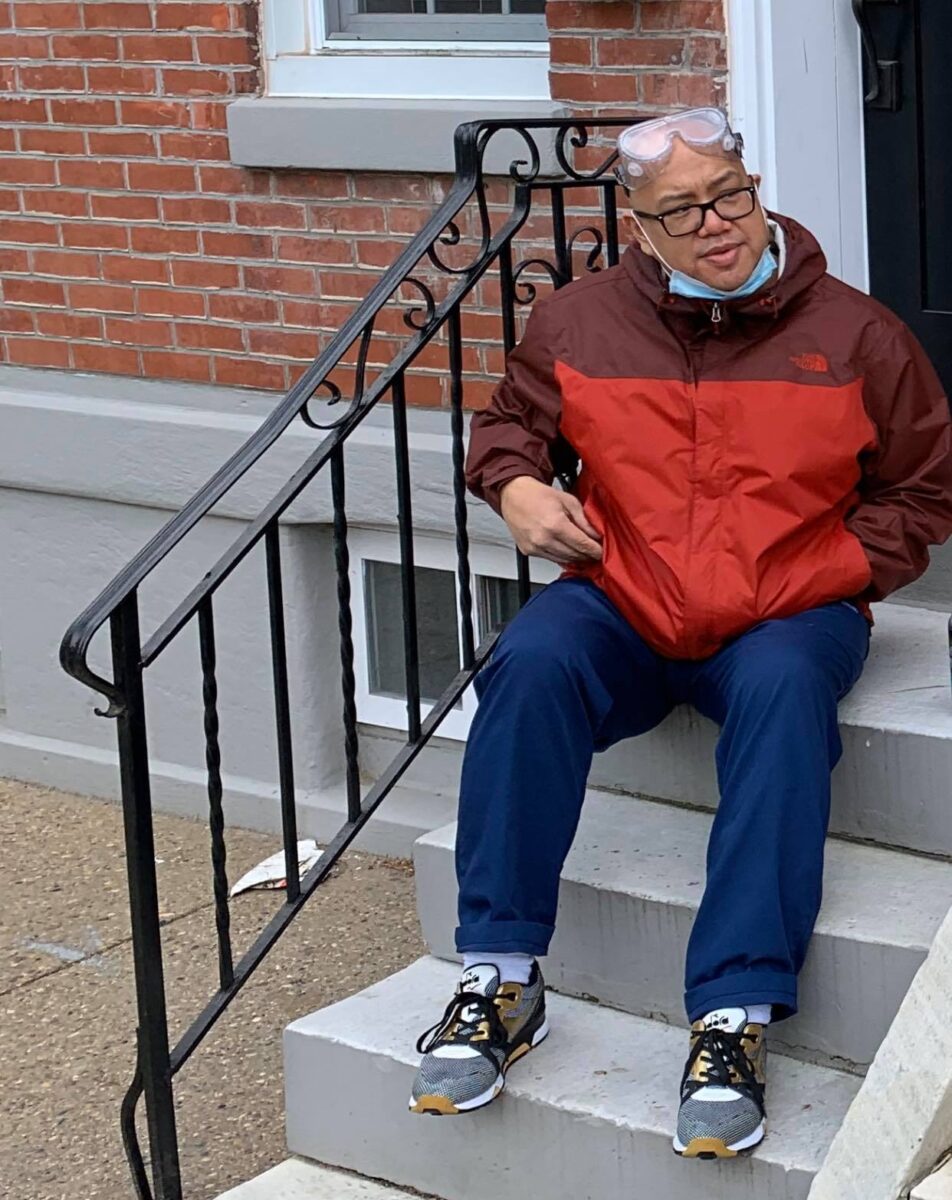
Josh Alvarez | photo courtesy of the artist
This is Essential: Josh Alvarez
During the coronavirus pandemic most people have been forced to work from home or, worse yet, they’ve been laid off or furloughed. But not everybody. We decided it would be interesting and important to shine a spotlight on some of the essential workers who are also members of our music community for a new series we’re calling This Is Essential.
In normal times, this would be an article about what Josh Alvarez does when he’s not at work. After all, the guitarist, bassist, and singer has been playing in bands for close to two decades – currently it’s the very catchy melodic hardcore five piece Crossed Keys, but you might remember him from Belegost, Halo of Snakes, or countless other bands. He is also one of the main contributors to the Cinepunx podcast, and is an all-around busy guy.
The article, were it written a couple months ago, would certainly touch on Alvarez’s day job as a mental health advocate at the psychiatric ward at Temple Episcopal. It would talk about how the members of the band are a bunch of do-gooders with a teacher, a therapist, and an assistant district attorney amongst their ranks. It might draw some parallels between his work and his long history in the punk scene, it might not. But right now, as we all know, is not normal and Alvarez is what’s deemed an essential worker. So while most of us are working from home or worse yet out of a job, he is still heading up to Kensington almost every day.
We caught up with Alvarez to talk about the last month and how that’s affected both his work and personal life and what he’s been doing to cope with the stress.

The Key: What’s your job?
Josh Alvarez: I’m a mental health technician at an acute psychiatric inpatient ward.
TK: How long have you been working there? What are your responsibilities?
JA: 18 years. It was actually the first job in mental health that I got. I help with the everyday running of the the unit. So, you know, we have to do therapeutic groups and stuff like that. Basically all the stuff that people need help doing, like helping to get showers and helping to like shave and all that other stuff, I do that but then I also do staff training because I’ve been there for so long.
TK: Why is this job important? Who are you serving?
JA: I serve mostly impoverished mentally ill people of North Philadelphia. The unit that I work on is dual diagnosis [ed. note: that means mental illness and substance abuse disorder]. It’s not specifically that, but we take everybody. They don’t turn anybody away at our crisis center.
I work with a group of doctors that work on getting [the patient’s] diagnosis together and medication regiments and all that stuff. And then basically I help facilitate what the doctors put into motion.
TK: And when somebody asks you why this is important, what’s your go-to answer after close to two decades of doing this work?
JA: You know me, Yoni, I’m a pretty simple dude. I don’t really need much to keep myself engaged. I just like doing things that help people, so that’s basically why I do this job.
TK: And how how did your your background in DIY music and the punk community lead you to this point?
JA: I think that, at its core, DIY music has always been for me an act of compassion. It’s a thing that you do because you care. It’s kind of the direct translation of that. I can’t think of another job where you can help people on a ground level, where you can do your best to help somebody right there and then.
Just like any job, it’s a grind. There are days when it’s just insufferable and difficult to deal with people and stuff. But at the end of the day, you know, for some of these people these are the only acts of kindness that they’re going to experience. And that’s a tragedy, I don’t like that. If that’s going to be the case I’d like to help and I’d like to be a part of that healing.
With pretty much every band I’ve ever been in, it’s always been about love and friendship. If you listen to the Crossed Keys records, they’re all about my friends. It’s the closest that I can come to a fair distillation of art and work at the same time.
TK: You’re saying that about the band or about your job?
JA: I’ve been working at this job for a long enough time that I’ve managed to create a process through which, without this work, my music doesn’t sound the same. But conversely without the things that I do when I’m not at work, the level of care and compassion that I can show at work isn’t the same either.
So right now it’s really fucked up because I haven’t had a band practice since this whole thing has started, and for me that’s my therapeutic…expression of all the anger and all just the vitriol that can build up from working in a psych unit. But without one the other suffers. There’s a total synergistic relationship between the two. So that’s what I’ve been dealing with. Just trying to keep my head up and trying to give the best care that I can to the people in my care while still taking care of myself without having my band.

TK: That was going to be my next question: how have things changed in the past month?
JA: It’s been tough, it’s been difficult. Just because, again, I’m not a competitive dude, I’m not a sports guy or anything like that. I don’t know about any of that life. So having just the positive outlet of punk rock helps. And without that it just changed the landscape of everything.
Thankfully I have my wife and I have my dog and I work with friends that I’ve worked with for the past 20 years I’ve been at the job. So there are people that I can talk to and people that can help me. The burden isn’t just mine. That said, all the coping mechanisms, all the way down to [going to the] movies, that stuff is all gone.
It’s real tenuous, you know what I mean? One of the things that happened in my unit since all this [started] is they’ve had to shut down a lot of things. They can’t have communal spaces open for everybody, so people that are in our care have to stay confined almost. It’s difficult because we don’t have the same arsenal of things that we would use to help people along on their journey.
TK: I read an article the other day where a nurse dealing with COVID-19 patients was talking about keeping a picture of them smiling pinned to their scrubbed so people will know what they look like underneath all that protective gear.
JA: We haven’t stopped taking admissions, so whenever we get new people on the floors now I have to be, like, “Hey I’m going to pull my mask down so you can see my face.” It’s not anything I want to be used to, but here we are.
TK: What’s been your theme song lately?
JA: I’ve been listening to “U Can’t Touch This” by MC Hammer and “Always Look on the Bright Side of Life” by Monty Python. That’s one that pretty much speaks to me at the moment.
I work with with my friend Shihem Harris, he’s a nurse and he’s been one of my best buds that I’ve worked with just this whole time. We both got hired on the same day. We listen to a lot of music together and and he and I have been getting down with some yacht rock, some Michael McDonald, stuff that in difficult times has been very helpful.
TK: Have you been making music?
JA: We’ve been recording songs here and there where Andrew or Dave will send me guitar stuff and I’ll sing over it. Andrew has been posting it on our pages and all that and it’s fine. But, like, I don’t know if it’s helpful or not, you know? I sing so I’m just going to sing but also I don’t know if we’re actually doing anything to help.
TK: What have you been watching?
JA: The last episode of Cinepunx that we did, I told Liam that we were doing feel-good movies. So we watched Big Night and we watched Legend of 1900 cause it’s just, like, dude I can’t. I’m not watching zombie movies right now. I’m not watching any of those things right now. I’m trying to keep it…I mean not so much light and positive, cause I’m not like a PMA dude or anything like that. But also I just can’t take it.
TK: From everything you’re talking about it sounds like your work environment is an even more stressful place right now, especially for the patients but also of course for you.
JA: Imagine having to deal with all this stuff [going on] now without your faculties intact. Having your very definitions of reality, which are already suspect, having those things be compromised. It sucks.
I don’t make any disillusion of the fact that I am a working stiff, after all. I mean, I’m just a dude. And I don’t really think that I’m doing anything that changes the world in a significant way. I’m just working. But also in the same breath I do realize that I’m not working a nine to five, you know. I’m actually working with people. So to that end, I definitely feel that I’m not going to give up now. That would be just kind of silly, you know? But also every day is just like, “You know, you could also just not do this and have another gig and it’s fine and nobody will judge you and it’ll be okay.”
But I don’t know if I’ve ever had just, like, a “job job.” I’ve worked here for so long now, it’s just been forever. So I don’t know what it would be like to [do anything else.]

TK: So why do you keep on doing this, especially with everything going on?
JA: I like helping people. Think about the fact that a lot of these people can’t have visitors now. There are no visitors in the hospital right now. So even if someone does give a shit about you, they can’t see you. That just breaks my heart, you know, and so if I can help I’m going to help.
TK: You mentioned the yacht rock. You mentioned the MC Hammer. Is there anything you’ve been listening to at home, any albums that you’ve been bumping a lot?
JA: I’ve been listening to pretty much all the shows that have been canceled because of this. So a lot of Pet Shop Boys, New Order, stuff like that. Shows that me and [my wife] Meilani were looking forward to going to that are now not happening. Rufus Wainwright I’ve been enjoying a lot just because he’s been doing live shows from his Instagram. He’s been doing these one-off songs and he’s playing a lot of super hits that we’ve never seen him do live. So that’s been really fun. And I’ve been listening to a lot of Crass, just, you know, your anarcho-punk staples. The industry standards for dealing with dystopia. A lot of Assuck. I was listening to Aus Rotten today for the first time in a while [as well as] Degenerics.
TK: What’s the relationship between this music and what you do at your job?
JA: I think that the cross section of the two is just the idea that it’s good to care for people. You know what I mean? It’s good to extend yourself to try and help people, especially the vulnerable communities of Philadelphia. And now’s the time for all of us who’ve been cultured in the DIY punk rock space.
I remember seeing Boysetsfire at Stalag, the first time I sever saw them, and it was them, Fields Lay Fallow, Catharsis, all those bands. Nathan [Gray from Boysetsfire] used to talk about taking everything that you learn on the inside and taking it outside the four walls of the venue [to] make that change. And I get it, I bought in either through idealistic naivety or being young. [But] I definitely don’t think that it’s a thing that we should be ashamed of and I don’t think it’s a thing that we should think of as like just an idealistic, youthful endeavor.
I think that there’s a way to live in music in the same way as in service. You can write songs and you can do your best to be an artistic outlet but also you can show your heart to people and do your best to help alleviate the things like pain and suffering. I think that that’s an important undertaking that people who come from our scene in particular can relate to.